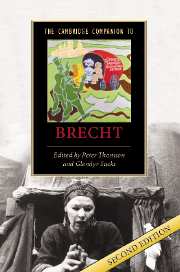3 - Brecht and cabaret
from Part I - Context and Life
Published online by Cambridge University Press: 28 March 2007
Summary
One of the most popular anecdotes about Brecht's early years in Munich involves a significant encounter with the popular comedian Karl Valentin (1882-1948).
In October 1922, following on from the success the previous month of the première of Drums in the Night at the Munich Kammerspiele, Brecht was appointed to the dramaturgical team of the theatre and was immediately given the task of rewriting and adapting Marlowe's Edward II. The writing took place over the winter of 1922/3, but the eight-week rehearsal period, then the longest in the Kammerspiele's history, did not start until January 1924. In one of his conversations with the essayist and critic Walter Benjamin on 29 June 1938, Brecht told the story of how 'the idea of Epic Theatre first came into his head' at one of these rehearsals:
The battle in the play is supposed to occupy the stage for three-quarters of an hour. Brecht couldn't stage manage the soldiers, and neither could Asya [Lacis], his production assistant. Finally he turned in despair to Karl Valentin, at that time one of his closest friends, who was attending the rehearsal, and asked him: 'Well, what is it? What's the truth about these soldiers? What about them?' Valentin: 'They're pale, they're scared, that's what!' The remark settled the issue, Brecht adding: 'They're tired.' Whereupon the soldiers' faces were thickly made up with chalk, and that was the day the production's style was determined.
A few years later, Brecht himself wrote a version of the same story in The Messingkauf Dialogues: 'When the Augsburger was producing his first play, which included a thirty minutes' battle, he asked Valentin what he ought to do with the soldiers. “What are soldiers like in battle?” Valentin promptly answered: “White. Scared.”' (pp. 69-70).
- Type
- Chapter
- Information
- The Cambridge Companion to Brecht , pp. 40 - 62Publisher: Cambridge University PressPrint publication year: 2006
- 1
- Cited by

